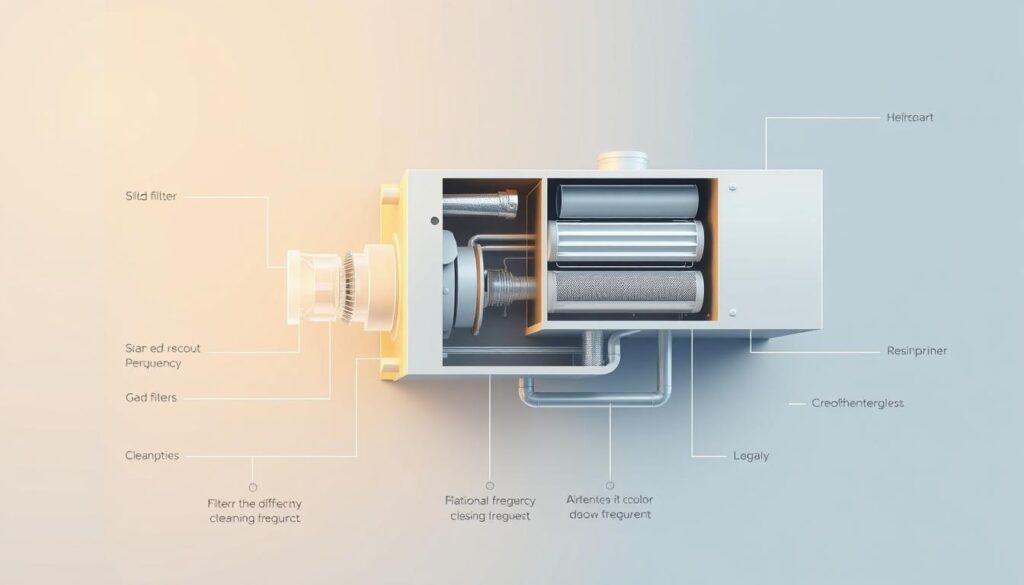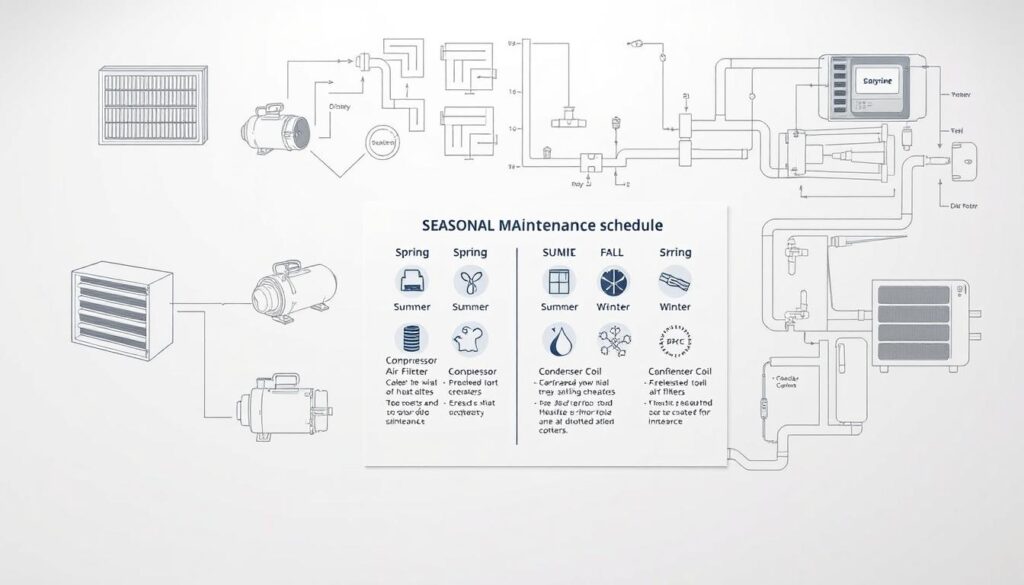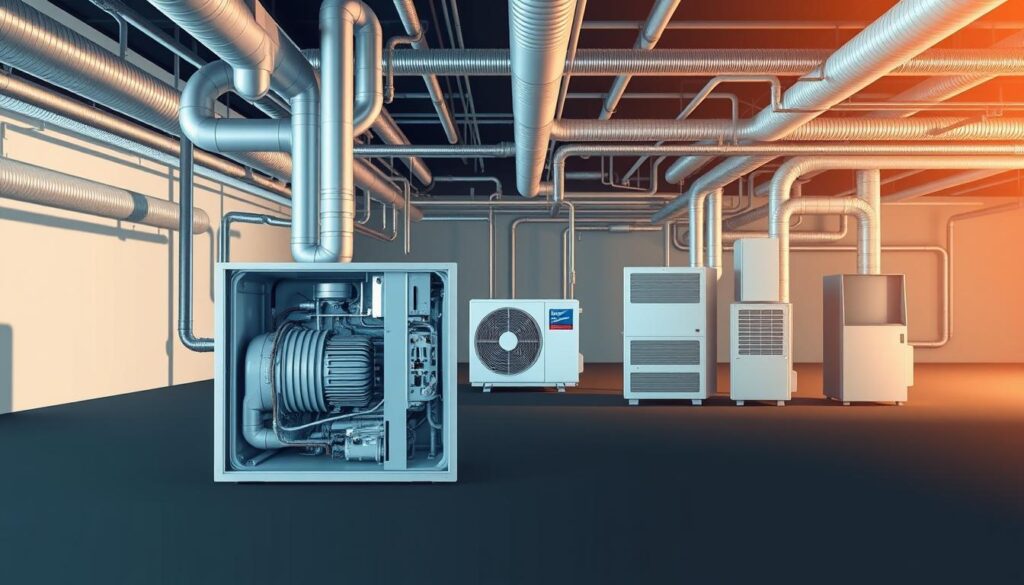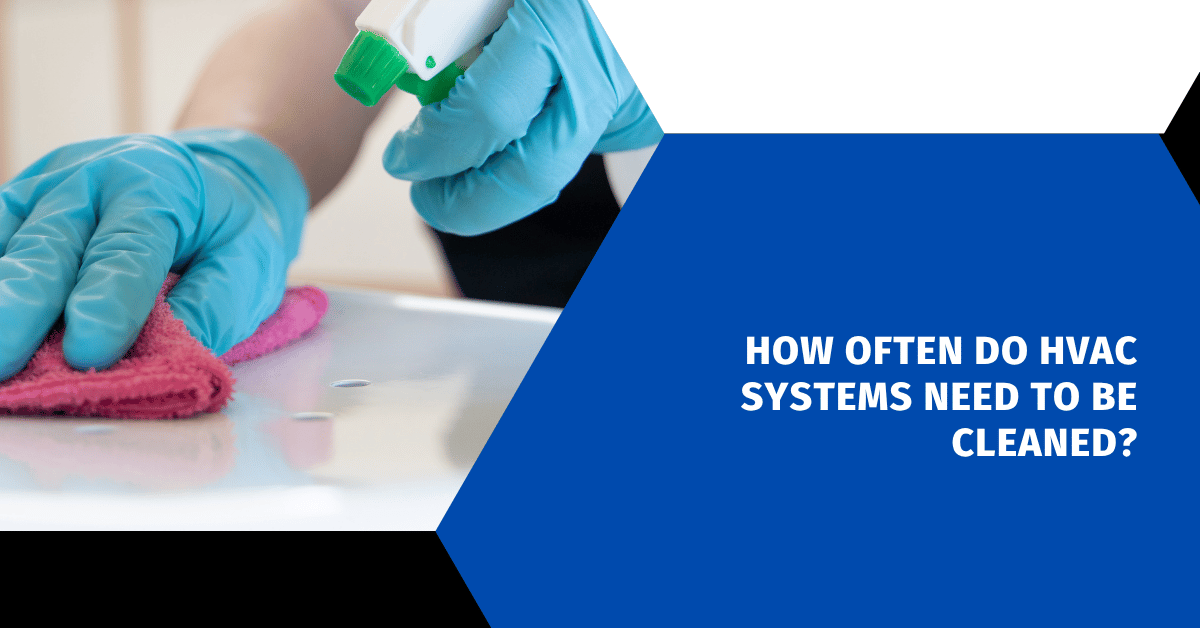Affiliate Disclosure
HVAC Guide Guys is a participant in the Amazon Services LLC Associates Program, an affiliate advertising program designed to provide a means for sites to earn advertising fees by advertising and linking to Amazon.
How Often Do HVAC Systems Need to Be Cleaned? Did you know that the air in your home might be hiding threats to your health and your HVAC system? Knowing how often to clean your HVAC is key to a healthy home.

Your HVAC maintenance schedule is important for keeping your system running well and the air clean. The National Air Duct Cleaners Association suggests professional cleaning every three to five years. But, this can change based on your home and lifestyle.
Regular cleaning boosts air quality and makes your system more efficient. This can lower your energy bills and avoid expensive repairs later. Dust, allergens, and debris build up fast, making regular maintenance essential for your home.
Key Takeaways
- HVAC systems typically need cleaning every 3-5 years
- Regular maintenance prevents system inefficiency
- Cleaning impacts indoor air quality significantly
- Environmental factors influence cleaning frequency
- Professional inspection helps determine exact cleaning needs
Table of Contents
Understanding HVAC System Maintenance Basics
Keeping your HVAC system in good shape is key for comfort and energy savings. A good maintenance plan can avoid expensive fixes and make your system last longer.
There’s more to HVAC care than just changing filters. It’s about a detailed approach to keep your system working well.
Essential Components Requiring Regular Cleaning
Your HVAC system has parts that need regular cleaning:
- Air filters (critical for air filter replacement frequency)
- Evaporator and condenser coils
- Blower motor and fan
- Drainage system
- Ductwork
Importance of Professional Maintenance
“A professional HVAC technician can identify problems before they cost a lot.” – HVAC Experts Association
Professional maintenance offers deep cleaning and checks that homeowners can’t do. Experts can:
- Do detailed system checks
- Check electrical connections
- Lubricate moving parts
- Measure refrigerant levels
- Calibrate thermostat settings
Basic DIY Maintenance Tasks
You can also do some maintenance to keep your system running well:
- Replace air filters every 1-3 months
- Keep outdoor units clear of debris
- Clean air vents and registers
- Check thermostat functionality
- Listen for unusual system noises
Proactive maintenance is key to preventing unexpected breakdowns and maintaining your HVAC system’s efficiency.
Explore Our HVAC Shop
Looking for top-rated HVAC tools, parts, and accessories? Visit our shop and find the perfect solution for your needs.
Visit the ShopHow Often Do HVAC Systems Need to Be Cleaned?
Keeping your HVAC system in top shape is key for its performance and life span. Knowing how often to clean your HVAC can save you money and avoid sudden breakdowns.
Experts say you should clean your HVAC system at least once or twice a year. The right cleaning schedule depends on several important factors.
- Home location and environmental conditions
- System age and current condition
- How often you use the system
- If you have pets or allergies
Different places need different cleaning schedules. Homes in polluted cities might need more cleaning than those in the countryside. The cost for a thorough cleaning by professionals is usually between $300 to $500.
| Environment Type | Recommended Cleaning Frequency | Average Cleaning Cost |
|---|---|---|
| Urban Areas | Twice Yearly | $400-$500 |
| Suburban Areas | Annually | $300-$400 |
| Rural Areas | Every 18 Months | $250-$350 |
Regular upkeep stops problems before they start. It keeps your HVAC running smoothly, saving energy and extending its life.
Signs Your HVAC System Requires Immediate Cleaning
Keeping your HVAC system in top shape is key for clean air inside your home. Spotting when it needs a clean can stop health problems and costly fixes.
Your HVAC system tells you when it’s dirty through clear signs. If you ignore these, your system might not work well and air quality could suffer.
Visual Indicators of Dirty Systems
- Visible dust accumulation around air vents
- Dark or discolored air filters
- Noticeable mold growth near ductwork
- Dirt and debris buildup on system components
Performance-Related Warning Signs
Your HVAC system might need cleaning if it’s not working right. Look out for these signs:
- Reduced airflow from vents
- Unusual rattling or whistling sounds
- Inconsistent temperature distribution
- Increased energy consumption
Indoor Air Quality Issues
A dirty HVAC system can make your indoor air bad. Watch for these signs:
| Symptom | Potential Cause |
|---|---|
| Persistent allergic reactions | Allergen buildup in ductwork |
| Musty or stale odors | Dust and microbial growth |
| Increased respiratory irritation | Contaminated air circulation |
Regular maintenance is vital for your HVAC system’s health and your home’s air quality. Cleaning it often cuts down on allergens, boosts performance, and makes your home healthier.
Explore Our HVAC Shop
Looking for top-rated HVAC tools, parts, and accessories? Visit our shop and find the perfect solution for your needs.
Visit the ShopAir Filter Replacement Schedule and Guidelines
Keeping your HVAC system running well is key. This means changing your air filters on time. The right schedule depends on your home and system’s needs.
Several things affect how often you need to change your filters:
- Filter type and size
- Indoor air quality
- Number of occupants
- Presence of pets
- Local environmental conditions
Here are some general guidelines for air filter replacements:
- 1-2 inch filters: Change every 30-90 days
- 3-4 inch filters: Change every 6 months
- 5-6 inch filters: Change annually
If you have allergies, pets, or a dusty home, you might need to change filters more often. Regular changes keep your system running smoothly. This saves energy and improves the air you breathe.
Pro tip: Set calendar reminders or subscribe to filter delivery services to ensure timely replacements.
Watch how your filters perform and adjust your schedule as needed. This will help your HVAC system work better. It will also make your air circulation better and reduce wear on parts.
Professional HVAC Cleaning Services: What to Expect
Professional duct cleaning services are key to keeping your home comfortable and air clean. Knowing what happens during HVAC cleaning helps you prepare and make smart choices for your system’s care.
Professional HVAC cleaning is more than just wiping down surfaces. Trained technicians use special tools to remove dust, debris, and harmful particles from your heating and cooling system.
Standard Cleaning Procedures
A thorough HVAC cleaning includes several important steps:
- Comprehensive system inspection
- Detailed ductwork cleaning
- Cleaning of air registers and vents
- Thorough cleaning of internal system components
- Air quality testing
Duration and HVAC Cleaning Cost
The time and cost of HVAC cleaning depend on your home’s size and system complexity. Most homes take 2-4 hours and cost between $450 to $1,000.
| Home Size | Estimated Cleaning Time | Cost Range |
|---|---|---|
| Small Home (1-2 bedrooms) | 2-3 hours | $350-$600 |
| Medium Home (3-4 bedrooms) | 3-4 hours | $450-$800 |
| Large Home (5+ bedrooms) | 4-5 hours | $700-$1,000 |
Choosing a Qualified Service Provider
When picking duct cleaning services, look at these important factors:
- Verify professional certifications
- Check customer reviews and ratings
- Request detailed service quotes
- Ensure they use professional-grade equipment
- Ask about their cleaning methodology
Investing in professional HVAC cleaning can greatly improve your home’s air quality and system efficiency.
Explore Our HVAC Shop
Looking for top-rated HVAC tools, parts, and accessories? Visit our shop and find the perfect solution for your needs.
Visit the ShopSeasonal Maintenance Requirements for Different HVAC Components

Creating a good hvac maintenance schedule is key to keeping your home comfy and energy-efficient. Each season has its own challenges for your heating and cooling systems. This means you need to focus on different maintenance tasks.
In spring, your air conditioning system needs extra care. Get ready for summer by:
- Cleaning or replacing air filters
- Checking refrigerant levels
- Inspecting outdoor condenser units
- Clearing debris around external components
Fall is the time to look after your heating system. Proactive furnace care prevents unexpected breakdowns during cold months. Important tasks include:
- Lubricating moving parts
- Checking electrical connections
- Examining heat exchanger for cracks
- Testing thermostat functionality
Winter is the time to focus on heat pumps and indoor parts. Make sure to seal any air leaks around windows and doors. This helps your hvac system work better and saves energy.
Consistent seasonal maintenance can reduce energy costs by up to 15% and extend your HVAC system’s lifespan.
Impact of Regular HVAC Cleaning on Energy Efficiency
Keeping your HVAC system in top shape is key to your home’s comfort and your budget. Regular cleaning is essential for better energy efficiency and a longer HVAC lifespan.
A dirty HVAC system uses more energy to keep your home at the right temperature. This means higher utility bills. But, with regular cleaning, you can enjoy big advantages:
- Reduce energy consumption by up to 15%
- Improve overall system performance
- Prevent premature wear and tear
- Maintain optimal indoor air quality
Cost Savings Benefits
Regular maintenance saves you money. A clean HVAC system uses less electricity. Experts say clean systems can save homeowners $50-$150 a year on energy costs.
System Performance Improvements
Clean HVAC parts work better, last longer, and keep your home at a steady temperature. This approach stops sudden breakdowns and extends your system’s life.
“Investing in regular HVAC maintenance is like giving your system a health checkup – it prevents major issues and keeps everything running smoothly.”
Explore Our HVAC Shop
Looking for top-rated HVAC tools, parts, and accessories? Visit our shop and find the perfect solution for your needs.
Visit the ShopSpecial Considerations for Different HVAC Types

Not all HVAC systems are the same. Each one needs its own cleaning method to work well and last longer. Knowing what your HVAC needs can keep your home comfortable and energy-efficient.
Different HVAC systems need special care:
- Heat Pumps: These systems need cleaning often because they work all year. Getting them checked annually helps keep them running smoothly.
- Ductless Mini-Split Systems: These systems need filter cleaning and careful unit checks to work at their best.
- Geothermal Systems: They don’t need cleaning as often but have complex maintenance due to underground parts.
Your HVAC type affects how often and how it’s cleaned. Geothermal systems might need less cleaning than air conditioning units. Heat pumps, which heat and cool, need more detailed maintenance.
Important factors for cleaning needs include:
- System age
- Local environmental conditions
- Usage intensity
- Manufacturer recommendations
Professional HVAC cleaning services can create maintenance plans for your system. They ensure your system works well and lasts longer.
Conclusion
Knowing how often to clean your HVAC system is key to keeping your home comfortable and efficient. It’s not just about cleaning. It’s about keeping your system running well and ensuring the air in your home is clean.
Your HVAC system is a big investment in your home’s comfort. Regular cleaning and maintenance can save you money, lower your energy bills, and make your home healthier. Getting professional checks and doing some maintenance yourself can make your system last longer.
Every HVAC system is different. What you need depends on how you use it, your home’s environment, and what kind of system you have. Create a maintenance plan that fits your home’s needs. Make sure to get professional checks every year, change your filters often, and clean your system regularly.
Maintenance is more than just fixing things. It’s about making your home a comfortable, efficient, and healthy place. Spend time and money on your HVAC system. You’ll get better air quality, lower energy bills, and reliable comfort for years.
FAQ
How often should I have my HVAC system professionally cleaned?
What are the signs that my HVAC system needs cleaning?
How often should I replace my HVAC air filters?
Can I clean my HVAC system myself?
How does regular HVAC cleaning impact energy efficiency?
What does a professional HVAC cleaning service typically include?
How often should I have my HVAC system professionally cleaned?
What are the signs that my HVAC system needs cleaning?
How often should I replace my HVAC air filters?
Can I clean my HVAC system myself?
How does regular HVAC cleaning impact energy efficiency?
What does a professional HVAC cleaning service typically include?
FAQ
How often should I have my HVAC system professionally cleaned?
You should get your HVAC system cleaned every 3 to 5 years. But, this can change based on your home’s location and how many people live there. If you have pets or allergies, you might need to clean it more often.
What are the signs that my HVAC system needs cleaning?
Look for dust buildup, higher energy bills, and less airflow. Musty smells and uneven heating or cooling are also signs. These can mean your system needs a good cleaning.
How often should I replace my HVAC air filters?
Change 1-3 inch filters every 90 days. If you have pets or allergies, do it every 30-60 days. Thicker filters can last 6-12 months, depending on your environment.
Can I clean my HVAC system myself?
You can change filters and clean vents yourself. But, for deep cleaning and maintenance, get a professional. DIY should focus on regular filter changes and keeping areas clean.
How does regular HVAC cleaning impact energy efficiency?
Cleaning can make your system 10-25% more efficient. This means less energy use, lower bills, and a longer system life.
What does a professional HVAC cleaning service typically include?
Services include duct cleaning, air handler checks, and coil cleaning. They also replace filters, sanitize systems, and test airflow. Costs range from 0 to
FAQ
How often should I have my HVAC system professionally cleaned?
You should get your HVAC system cleaned every 3 to 5 years. But, this can change based on your home’s location and how many people live there. If you have pets or allergies, you might need to clean it more often.
What are the signs that my HVAC system needs cleaning?
Look for dust buildup, higher energy bills, and less airflow. Musty smells and uneven heating or cooling are also signs. These can mean your system needs a good cleaning.
How often should I replace my HVAC air filters?
Change 1-3 inch filters every 90 days. If you have pets or allergies, do it every 30-60 days. Thicker filters can last 6-12 months, depending on your environment.
Can I clean my HVAC system myself?
You can change filters and clean vents yourself. But, for deep cleaning and maintenance, get a professional. DIY should focus on regular filter changes and keeping areas clean.
How does regular HVAC cleaning impact energy efficiency?
Cleaning can make your system 10-25% more efficient. This means less energy use, lower bills, and a longer system life.
What does a professional HVAC cleaning service typically include?
Services include duct cleaning, air handler checks, and coil cleaning. They also replace filters, sanitize systems, and test airflow. Costs range from $300 to $1,000, based on your system’s size.
Are there special maintenance requirements for different HVAC types?
Yes, different systems need different care. Heat pumps need maintenance twice a year. Geothermal systems should be checked every 3-5 years. Mini-splits need quarterly filter cleaning and annual service.
How does HVAC cleaning impact indoor air quality?
Cleaning removes allergens and prevents mold. It keeps your air clean, which is great for people with allergies or asthma. Clean systems improve your home’s air quality.
,000, based on your system’s size.
Are there special maintenance requirements for different HVAC types?
Yes, different systems need different care. Heat pumps need maintenance twice a year. Geothermal systems should be checked every 3-5 years. Mini-splits need quarterly filter cleaning and annual service.
How does HVAC cleaning impact indoor air quality?
Cleaning removes allergens and prevents mold. It keeps your air clean, which is great for people with allergies or asthma. Clean systems improve your home’s air quality.

